#yekaterina ii
Explore tagged Tumblr posts
Text




The Royal Jewels of Iverny (part 1)
Queen Catherine's Emerald Diadem
Out of any tiara in the Ivernian royal collection, none are more closely associated with one specific member of the royal family than the emerald and diamond kokoshnik often worn by Princess Claudia, Princess Royal. While it is lovingly called "Princess Claudia's Tiara" by both the public and the royal family, the tiara is formally known as Queen Catherine's Emerald Diadem.
In 1891, Grand Duchess Yekaterina Alexandrovna of Russia, a great-granddaughter of Emperor Paul I of Russia, was betrothed to the third son of King Philip III of Iverny and Queen Mary Josephine, Prince Richard, the future Duke of Ettinger. As a wedding gift, the bride's parents commissioned a kokoshnik tiara set with emeralds from the collections of the bride's grandmothers, Grand Duchess Elena Pavlovna and Grand Duchess Anna Feodorovna. The young Yekaterina was delighted, and the tiara became a beloved reminder of home as she entered in to a new chapter of life in Iverny as Duchess of Ettinger.
After the tragic and sudden death of her niece Queen Jane II in the fall of 1918, Catherine stepped into her new role as consort alongside her husband, the newly crowned King Richard V. Her emerald kokoshnik tiara was worn for countless state dinners, galas, balls, and portraits throughout her eight-year tenure as queen, and into the 1930s and 1940s in her role as Queen Mother.
In 1949, on the occasion of her granddaughter's 15th birthday, Queen Catherine gifted the tiara to King Arthur V's only daughter, Princess Catherine. The young Princess Royal was said to be "positively elated" by the gift from her namesake. The Princess Royal wore the tiara regularly up until the early 1970s, when she gifted it to her niece, Princess Claudia. Reportedly, the note given to Princess Claudia alongside the tiara read "from one Princess Royal to Another, from your dear Aunt Cathy."
Princess Claudia first debuted Queen Catherine's Emerald Diadem in 1972. Over the past fifty years, the Princess Royal has worn the tiara almost exclusively, from her brother's coronation in 1976 to her own wedding in 1988 to nearly every state dinner. It is unknown if the Princess Royal will continue to wear the tiara into her old age, or if she will pass it on to her own niece, the junior Princess Royal, Princess Caroline, Countess Hatheway, as many anticipate.
HRH Catherine, Duchess of Ettinger, wears the yet-unnamed tiara in a portrait photograph, 1893.
HM Queen Catherine's first official painted portrait in her role as Queen consort, 1921.
HRH Princess Catherine, Princess Royal, wears her grandmother's Emerald Diadem at the French State Dinner, 1957.
HRH Princess Claudia, Princess Royal, shakes hands with guests at His Majesty's Charity Benefit Gala in Gaucelin, 1980.
post inspired by @warwickroyals 💙
#sims 4#ts4 royalty#the lorimers#ivernian royal jewels#lorimers: queen catherine#lorimers: princess catherine#lorimers: claudia#bluep.txt
33 notes
·
View notes
Text










Women’s History Meme || Mistresses (6/10) ↬ Yekaterina Mikhailovna Dolgorukova (1847 – 1922)
By the next morning, of course, the court knew. The ladies-in waiting of the late empress were stunned and angered. The witnesses had to justify their behavior by explaining they were commanded to do so. The news traveled instantly from Tsarskoye Selo to St. Petersburg. Mme Bogdanovich recorded her “profound indignation” in her diary. The general reaction was “the old emperor has immediately forgotten his poor wife and married a young debauched woman.” The two-faced Janus didn’t get it, yet again. The despot Peter the Great could marry a cook and make her an empress— precisely because he was a despot. Alexander, who wanted to rule European-style, had to think about public perception all the time. But he had been brought up by his father, and he could not get used to the idea of public accountability. That night she slept in the palace, in his bed, and he sat at his desk and finalized formalities. He signed the necessary decree: “To the Government Senate: Having entered a second time into a legal marriage, with Princess Ekaterina Mikhailovna Dolgorukaya, we command her to be named Princess Yuryevskaya with the title Serene Princess. We command that the same name with the same tide be given to our children: our son, Georgii, our daughters Olga and Ekaterina, and also to any others that might be born subsequently, and we confer upon them all the rights of legitimate children in accordance with article 14 of the empire’s basic laws and article 147 of the Statutes on the Imperial Family. — Alexander II: The Last Great Tsar by Edvard Radzinsky While sex between even the lustiest pair usually fizzled after a few years, Czar Alexander II (1818–1881) and his pretty brunette mistress Katia Dolguruky enjoyed a passionate sex life throughout a fifteen-year relationship that ended only with his death. Though profoundly stupid, Katia was thirty years younger than Alexander and adored lovemaking. In 1870 the czar wrote her, “What I felt within me you saw for yourself, just as I saw what was happening to you. That was why we clenched each other like hungry cats both in the morning and in the afternoon, and it was sweet to the verge of madness, so that even now I want to squeal for joy and I am still saturated in all my being.” — Sex With Kings: 500 Years of Adultery, Power, Rivalry, and Revenge by Eleanor Herman
#women's history meme#catherine dolgorukova#house of romanov#russian history#european history#women's history#history#19th and early 20th#nanshe's graphics
26 notes
·
View notes
Text
Yekaterina Efimova

Yekaterina Efimova Екатерина Ефимова, “Dance of the Palestinian Slaves” from “Le Corsaire Корсар” choreo by Jules Perrot, Marius Petipa and Pyotr Gusev Петр Гусев, libretto by Jules Henri Vernoy de Saint Georges and Joseph Mazilier, edited by Yury Slonimsky Юрий Слонимский and Pyotr Gusev Петр Гусев based on a long tale in verse “The Corsair” (1814) by Lord George Byron, music by Adolphe Adam, Cesare Pugni, Léo Delibes, Riccardo Drigo and Pyotr Oldenburg Петр Ольденбургский, Mariinsky Ballet Мариинский театр, Saint Petersburg, Russia.
Source and more info at: Photographer Mikhail Vilchuk Website Photographer Mikhail Vilchuk on Facebook Photographer Mikhail Vilchuk on Instagram Photographer Mikhail Vilchuk on VKontakte
via: Yekaterina Efimova on Instagram
Note I: This blog is open to receiving and considering any suggestions, contributions, and/or criticisms that may help correct mistakes or improve its content. Comments are available to any visitor.
Note II: Original quality of photographs might be affected by compression algorithm of the website where they are hosted.
#Adolphe Adam#Cesare Pugni#Dance of the Palestinian Slaves#Корсар#Joseph Mazilier#Jules Henri Vernoy de Saint-Georges#Jules Perrot#Léo Delibes#Le Corsaire#Lord George Byron#Mariinsky Ballet Мариинский театр#Marius Petipa#Mikhail Vilchuk Михаил Вильчук#Pyotr Gusev Петр Гусев#Pyotr Oldenburgsky Петр Ольденбургский#Riccardo Drigo#Russian Ballet#The Corsair#Yury Slonimsky Юрий Слонимский#Yekaterina Efimova Екатерина Ефимова
2 notes
·
View notes
Text
It's a shame that I, as a Ukrainian, never wrote what I think about russia's name in hetalia.
Because it's so damn lifeless. XD I see plenty of people referring to Ukraine as Katyusha (nickname made from russian Yekaterina, has nothing to do with Ukraine) and to Belarus as Natasha (russified nickname, which appeared, according to russian sources, in the 18th century, and according to American sources, in 1965, has nothing to do with Belarus) - but, for some reason, Great Russia doesn't want to have 100% russian name:
Ivan is the name of ancient Hebrew origin, which translates as "Mercy of God." It is formed from the ancient form of Ioann. This name is definitely older than russia itself. This name is commonly used in Ukrainian and Belaruthian folk songs, this name is used to refer to Ivana Kupala celebration: the name arose at a time when the Christian church wanted to replace a pagan holiday with a new religion.
Not even England has such an average name: it's like if they used John Brown instead of Arthur Kirkland.
Now about the surname: and I will use quotes from russian(!) sources:
The surname Braginsky belongs to a common type of Jewish surnames.
The Jews of the Russian Empire began to be given surnames at the end of the 18th century, after the western regions of Belarus, Ukraine and the Baltic states were annexed to the Russian Empire - after the partition of Poland.
Then Catherine II "acquired" along with the western regions a huge number of Jews who historically did not have surnames, but only a first name and patronymic, for example, "Moishe, son of Shmelke."
And my favourite:
"So, the surname Braginsky owes its origin to the urban settlement of Bragin - at present, it is the regional centre of the Gomel region of the Republic of Belarus. The settlement was founded in the 16th century."
Gomel region? The region from which locals like to joke that they use Ukrainian with Belaruthian letters? (Lots of my relatives are from there, and some of them even identify themselves as Ukrainians).
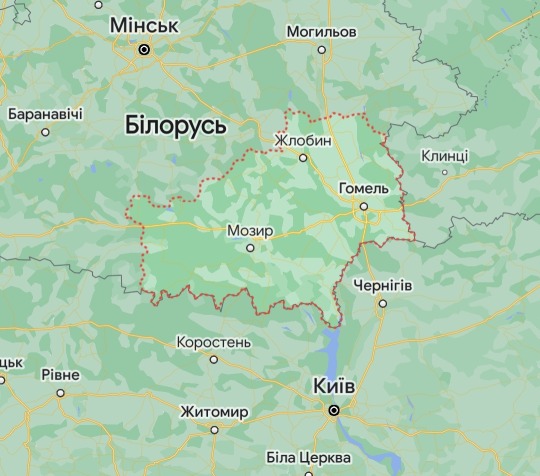
What an interesting name for personification of russia to have. Especially considering how much russia hates both Jews, Ukrainians, and Belaruthians. This name literally screams: "Look, I am not a nazi." And I really doubt Hidekaz Himaruya, who clearly isn't versed in never-soviet countries' culture, would choose this name without influence from his sponsors.
If russia loves its culture so much, why did they choose what they chose? Why doesn't its personification have a perfectly russian name? I will even translate some of the greatest examples for you:
Dalis - Да здравствуют Ленин и Сталин!Long live Lenin and Stalin!
Delezh — Дело Ленина живёт! The deed of Lenin lives!
Deleor — Дело Ленина — Октябрьская революция! The deed of Lenin -- October Revolution!
Dazdrasen — Да здравствует Седьмое ноября! Long live November 7th!
Avtodor -- Общество содействия развитию автомобилизма и улучшению дорог. Society for the Promotion of Motoring and Road Improvement
Agitprop -- Отдел агитации и пропаганды при ЦК ВКП (б). Department of Agitation and Propaganda under the Central Committee of the All-Union Communist Party of Bolsheviks
Glasp -- гласность печати. Publicity of the press.
Karmiy -- Красная Армия. Red Army.
Kid -- коммунистический идеал. Communist ideal.
Kravasil -- Красная армия всех сильней!The Red Army is the strongest of all!
Kukutsapol -- "Кукуруза — царица полей!" Corn - the queen of the fields!
Piachegod -- "Пятилетку — в четыре года!" "Five-Year Plan - in four years!"
Revvol — революционная воля - revolutionary will
Revdar — революционный дар revolutionary gift
Yurgoz -- Юрий Гагарин облетел Землю -- Yuri Gagarin circled the Earth
Zamvil — заместитель В. И. Ленина -- Deputy of V. I. Lenin
Idlen -- Ideas of Lenin
Vidlen - Great ideas of Lenin
Vinun — "Владимир Ильич не умрёт никогда" -- "Vladimir Ilyich (Lenin) will never die"
Lunio – "Ленин умер, но идеи остались" - Lenin died, but the ideas remained!"
Lelud — Ленин любит детей -- Lenin loves children
Lengenmir -- "Ленин - гений мира!" -- "Lenin - the genius of the world!"
Lestak - Lenin, Stalin, communism!
Pofistal – Победитель фашизма Иосиф Сталин -- "The winner of fascism, Joseph Stalin."
Yausyaukh – "Я устал, я ухожу" - "I'm tired, I'm leaving."
Porof - Позор российскому футболу - Shame on Russian football.
Motevsor - мочить террористов в сортире - kill terrorists in the toilet.
Dogzeb -- "Догзеб – Доллар – грязная зеленая бумажка" - "Dollar is a dirty green paper"
And it's only a little part of what exists. If there are so many great, purely russian names, why to name russia after "stupid khokhols" (russian slur about Ukrainians) or "bulbashi" (russian slur about Belaruthians) or "zhydy"(russian slur about Jewish)?
18 notes
·
View notes
Text
Blood and Snow: The Fall of a Dynasty
Yekaterina's lineage constitutes a fascinating account of reinvention and resistance, defying the historical weight of a name intrinsically associated with both opulence and tragedy. As a descendant of the Romanov dynasty, his story finds a significant breaking point in the figure of Alexei Romanov, younger brother of Tsar Nikolai lI, whose trajectory became a landmark of ideological and historical transformation.
From his youth, Alexei demonstrated a restless spirit and was deeply dissatisfied with the structural inequities that sustained the autocratic regime. Driven by a fascination with the progressive ideas that were buzzing in clandestine intellectual circles, he became close to renowned revolutionary figures, such as Vladimir Lenin, with whom he shared a friendship and a vision of social justice that transcended ideological barriers. For Nikolai II, the revolutionary movement was an existential threat to the monarchy; for Alexei, it represented an invaluable opportunity for emancipation for the Russian people.
With the advent of the Russian Revolution in 1917, Alexei assumed an unequivocal position, standing out as a financier of Bolshevik groups and as the author of manifestos that denounced the foundations of the monarchical regime. This stance aggravated tensions within the Romanov dynasty, culminating in his arrest, ordered by Nikolai II. In an extreme gesture, aiming to ensure the maintenance of the throne, the tsar ordered his execution, publicly disguised as an accident. However, Alexei's closest people, including Lenin and his wife, Sofia Ivanovna, knew the true nature of what happened. For Lenin, Alexei's death not only reinforced his revolutionary momentum, but also became a personal matter of revenge against the monarchy.
Sofia Ivanovna, pregnant at the time of the tragic event, went into exile in Western Europe, taking with her the memory of Alexei and the son she was carrying. This one, Andrei Alexeevich Romanov, grew up in exile, being educated in France and, later, in England, where he became an intellectual committed to socialist ideals and the anti-fascist struggle. He later married Irina Vasilievna, also a Russian exile, and together they built a family that perpetuated the progressive values and rich cultural heritage of their origins.
The first-born, although bearing the Tsar's name, a choice filled with bitter irony considering the historical weight of his lineage, was in reality named in honor of Irina's father, Nikolai Vasilievich, a man of remarkable virtue and widely admired, whose life was tragically taken during the Revolution. This son, Nikolai Andreevich Romanov, stood out as an eminent sociologist, dedicating his career to the in-depth study of authoritarian regimes and their social implications. His sister, Natalia Andreevna Romanova, established herself as a highly respected intellectual, serving as administrator of the Saint Petersburg City Library, being widely recognized for her literary studies and work preserving historical manuscripts. Viktor Andreevich Romanov, the youngest brother, chose to pursue a scientific career, receiving international recognition for his significant contributions to the fields of genetics and molecular biology. Yelena Andreevna Romanova, in turn, stood out as a painter of unique talent, in addition to teaching as a professor of Art History at one of the most prestigious universities in the former imperial capital.
Nikolai married Anna Petrovna, a historian of high academic reputation, with whom he had an only daughter: Yekaterina-Elizaveta Nikolaevna Romanova, heir to the idealistic and revolutionary spirit of her descendants.
0 notes
Text
Yekaterina's lineage constitutes a fascinating account of reinvention and resistance, defying the historical weight of a name intrinsically associated with both opulence and tragedy. As a descendant of the Romanov dynasty, her story finds a significant breaking point in the figure of Alexei Romanov, younger brother of Tsar Nikolai lI, whose trajectory became a landmark of ideological and historical transformation.
From his youth, Alexei demonstrated a restless spirit and was deeply dissatisfied with the structural inequities that sustained the autocratic regime. Driven by a fascination with the progressive ideas that were buzzing in clandestine intellectual circles, he became close to renowned revolutionary figures, such as Vladimir Lenin, with whom he shared a friendship and a vision of social justice that transcended ideological barriers. For Nikolai II, the revolutionary movement was an existential threat to the monarchy; for Alexei, it represented an invaluable opportunity for emancipation for the Russian people.
With the advent of the Russian Revolution in 1917, Alexei assumed an unequivocal position, standing out as a financier of Bolshevik groups and as the author of manifestos that denounced the foundations of the monarchical regime. This stance aggravated tensions within the Romanov dynasty, culminating in his arrest, ordered by Nikolai II. In an extreme gesture, aiming to ensure the maintenance of the throne, the tsar ordered his execution, publicly disguised as an accident. However, Alexei's closest people, including Lenin and his wife, Sofia Ivanovna, knew the true nature of what happened. For Lenin, Alexei's death not only reinforced his revolutionary momentum, but also became a personal matter of revenge against the monarchy.
Sofia Ivanovna, pregnant at the time of the tragic event, went into exile in Western Europe, taking with her the memory of Alexei and the son she was carrying. This one, Andrei Alexeevich Romanov, grew up in exile, being educated in France and, later, in England, where he became an intellectual committed to socialist ideals and the anti-fascist struggle. He later married Irina Vasilievna, also a Russian exile, and together they built a family that perpetuated the progressive values and rich cultural heritage of their origins.
The first-born, although bearing the Tsar's name, a choice filled with bitter irony considering the historical weight of his lineage, was in reality named in honor of Irina's father, Nikolai Vasilievich, a man of remarkable virtue and widely admired, whose life was tragically taken during the Revolution. This son, Nikolai Andreevich Romanov, stood out as an eminent sociologist, dedicating his career to the in-depth study of authoritarian regimes and their social implications. His sister, Natalia Andreevna Romanova, established herself as a highly respected intellectual, serving as administrator of the Saint Petersburg City Library, being widely recognized for her literary studies and work preserving historical manuscripts. Viktor Andreevich Romanov, the youngest brother, chose to pursue a scientific career, receiving international recognition for his significant contributions to the fields of genetics and molecular biology. Yelena Andreevna Romanova, in turn, stood out as a painter of unique talent, in addition to teaching as a professor of Art History at one of the most prestigious universities in the former imperial capital.
Nikolai married Anna Petrovna, a historian of high academic reputation, with whom he had an only daughter: Yekaterina-Elizaveta Nikolaevna Romanova, heir to the idealistic and revolutionary spirit of her descendants.
Yekaterina-Elizaveta Nikolaevna Romanova was born on November 21, 1995, in Saint Petersburg, a city that carries both the weight of history and the melancholy poetry of Russian autumn. This season, with its palette of gray and gold tones, became a metaphor for her introspective and contemplative soul. From the first years of her life, she was introduced to the rich and turbulent history of her family, especially the legacy of Alexei Romanov, whose courage and revolutionary idealism shaped her early reflections on justice, freedom and resilience.
As a child, Yekaterina immersed herself deeply in the world of arts. The piano, an instrument she started playing as a child, became a refuge where she translated her emotions into melodies. Writing, through short stories and poetry, served as another channel to explore her imagination and give voice to her feelings. At the same time, her passion for drawing allowed scenes and landscapes from her mind to come to life on paper. Furthermore, surrounded by delicacy and discipline, she practiced classical ballet for years, developing a unique sensitivity. Although she left dancing in her teens, her passion for movement found new form in ice skating, an activity she embraced enthusiastically, especially during the winters when the frozen lakes of St. Petersburg became her favorite stage.
Throughout her youth, a love of new cultures and places sparked in Yekaterina a desire to explore the world beyond Russian borders. This desire came true at the age of 18, when she was accepted into the renowned University of Oxford, in England, to study literature. During this period, she dedicated herself to writing her first novel, “The Last Kiss of the Revolution”, inspired by the lives of Alexei and Sofia Romanov. The work, which addressed ethical and emotional dilemmas in times of change, was widely acclaimed by critics and achieved international success.
After completing her training, Yekaterina decided to return to Saint Petersburg, the city she always considered her true home. There, given the poor health of her aunt Natalia, a central figure in her childhood, she was asked to take over the administration of the municipal library, which her aunt had led with dedication for decades. The transition occurred naturally, as Yekaterina deeply understood the importance of preserving knowledge and promoting access to culture. Under her management, the library was completely revitalized, transforming into a vibrant cultural space, with literary events, exhibitions and debates on Russian history and art.
Parallel to her activities at the library, Yekaterina delved into the study and production of Gothic literature, inspired by authors such as Mary Shelley and Bram Stoker. Her writings, which explore themes such as loneliness, death, the supernatural and the recesses of human psychology, have gained wide recognition both in Russia and internationally. Over the years, her works have consolidated her reputation as one of the most influential contemporary authors on the world literary scene.
0 notes
Text
games
i - two of clubs - prison escape
atlas - dead sanvi zane layla lars rosalia eros yekaterina hermes olympia cleon constantina tony jane jamie kasia anton victoria holden aquata - dead heath circe noah astrid
ii - five of spades - tag
sanvi zane layla - dead lars rosalia eros yekaterina hermes olympia cleon constantina tony - dead jane jamie - dead kasia anton victoria holden heath circe noah astrid - dead
iii - three of hearts - truth or dare
sanvi vs jane: alliance zane vs noah: truth lars vs holden: love rosalia vs kasia: trouble eros vs yekaterina: betrayal hermes vs cleon: betrayal olympia vs constantina: friendship heath vs circe: friendship anton vs victoria: friendship/betrayal
iv - mix
seven of spades (4) noah, rosalia, anton, circe
seven of hearts (4) eros, yekaterina, victoria, olympia
seven of clubs - ludo (4) sanvi, jane, hermes, kasia
seven of diamonds - chess (6) team 1 - zane, lars, holden team 2 - cleon, heath, konstantina
v - marbles (king of hearts)
noah - circe anton - zane yekaterina - hermes lars - holden
vi - jack of spades
noah lars anton
0 notes
Text
"After having been rescued by Soviet troops, Orenstein emigrated to the United States in 1947, changed his first name to "Henry" and soon opened his own grocery store, which he eventually sold off. He subsequently became president and CEO of Deluxe Reading (also known under its brands Deluxe Topper, Deluxe Toy Creations, Topper Corp., Topper Toy Group, and Topper Toys), where he invented many successful toys such as the Johnny Lightning cars, the Johnny Seven OMA, and the Dawn dolls. Overall, Orenstein held over 100 patents in the toy field. Mattel allegedly had meetings on how to stop the man.[2] However, in 1973, Topper Toys/Deluxe Reading filed for bankruptcy. [3] The Securities and Exchange Commission also sought an injunction against Topper Toys, Orenstein, and other officers of the corporation, for violation of antifraud, registration, and corporate reporting provisions related to a public offering of stock.[4] An injunction was entered in 1974 by consent without Orenstein or the other defendants admitting or denying the allegations.[5] Subsequently, Orenstein went on to be a pitch-man for toy companies like Hasbro.
In 1983, he went to Takara to convince their president that their transforming toys were ripe for an American rebrand and then went on to successfully sell Hasbro CEO Stephen D. Hassenfeld on creating what became Transformers. As well as being "the bridge" between Hasbro and Takara, he facilitated the meeting between Dunsay and Takara that would be influential on the rest of the line.[6][7] Following that, he created the rubsign. While this was his last contribution to the franchise, it made him quite a bit of money and he proudly talked about it a lot at the time.
In 1987, Orenstein, already in his mid-60s, discovered the world of poker. Finding television broadcasts of poker games "boring", he invented the hole card camera, the table-level camera that allows television audiences and announcers to view players' hands and hidden cards. This innovation led to a boom in poker tournaments[8] and television shows, some of which were launched by Orenstein himself. As a result, he was inducted into the Poker Hall of Fame in 2008.
The Lejb and Golda Orenstein Building, an eleven-story building for low-income families in New York City, is named after Henry Orenstein's parents who died in the Holocaust. Henry Orenstein himself paid for air conditioners in all apartments and security. Another Lejb and Golda Orenstein Building is located in Kiryat Ono, Israel, which was also largely funded by Henry Orenstein. He also ensured Yekaterina Lipinskaja, the Polish woman who sheltered his family for months, was added to Israel's Righteous among the Nations memorial for gentiles who aided Jews in the Holocaust.
Orenstein also authored two books, his autobiography I Shall Live: Surviving Against All Odds, 1939-1945 (1987, reissued in 2010 as I Shall Live: Surviving the Holocaust 1939-1945 and as an e-Book I Shall Live: Surviving the Holocaust Against All Odds) and Abram: The Life of an Israeli Patriot (1999), a biography of Abram Silberstein, who fought in the British Army during World War II.
At the age of 98, Mr. Orenstein passed away due to complications of COVID-19 at his home in New Jersey."
in honor of that anon who said jews have done nothing for the world, here’s a non exhaustive list of things we’ve done for the world:
arts, fashion, and lifestyle:
jeans - levi strauss
modern bras - ida rosenthal
sewing machines - isaac merritt singer
modern film industry - carl laemmle (universal pictures), adolph zukor (paramount pictures), william fox (fox film forporation), louis b. mayer (mgm - metro-goldwyn-mayer), harry, sam, albert, and jack warners (warner bros.), steven spielberg, mel brooks, marx brothers
operetta - jacques offenbach
comic books - stan lee
graphic novels - will eisner
teddy bears - morris and rose michtom
influential musicians - irving berlin, stephen sondheim, benny goodman, george gershwin, paul simon, itzhak perlman, leonard bernstein, bob dylan, leonard cohen
artists - mark rothko
actors - elizabeth taylor, jerry lewis, barbara streisand
comedians - lenny bruce, joan rivers, jerry seinfeld
authors - judy blume, tony kushner, allen ginsberg, walter mosley
culture:
esperanto - ludwik lazar zamenhof
feminism - betty friedan, gloria steinem, ruth bader ginsberg
queer and trans rights - larry kramer, harvey milk, leslie feinberg, abby stein, kate bornstein, frank kameny, judith butler
international women's day - clara zetkin
principles of journalizm, statue of liberty, and pulitzer prize - joseph pulitzer
"the new colossus" - emma lazarus
universal declaration of human rights - rene samuel cassin
holocaust remembrance and human rights activism - elie wiesel
workers rights - louis brandeis, rose schneiderman
public health care, women's rights, and children's rights - lillian wald
racial equity - rabbi abraham joshua heschel, julius rosenwald, andrew goodman, michael schwerner
political theory - hannah arendt
disability rights - judith heumann
black lives matter slogan and movement - alicia garza
#metoo movement - jodi kantor
institute of sexology - magnus hirschfeld
technology:
word processing computers - evelyn berezin
facebook - mark zuckerberg
console video game system - ralph henry baer
cell phones - amos edward joel jr., martin cooper
3d - leonard lipton
telephone - philipp reis
fax machines - arthur korn
microphone - emile berliner
gramophone - emile berliner
television - boris rosing
barcodes - norman joseph woodland and bernard silver
secret communication system, which is the foundation of the technology used for wifi - hedy lamarr
three laws of robotics - isaac asimov
cybernetics - norbert wiener
helicopters - emile berliner
BASIC (programming language) - john george kemeny
google - sergey mikhaylovich brin and larry page
VCR - jerome lemelson
fax machine - jerome lemelson
telegraph - samuel finley breese morse
morse code - samuel finley breese morse
bulletproof glass - edouard benedictus
electric motor and electroplating - boris semyonovich jacobi
nuclear powered submarine - hyman george rickover
the internet - paul baran
icq instant messenger - arik vardi, yair goldfinger,, sefi vigiser, amnon amir
color photography - leopold godowsky and leopold mannes
world's first computer - herman goldstine
modern computer architecture - john von neumann
bittorrent - bram cohen
voip internet telephony - alon cohen
data archiving - phil katz, eugene roshal, abraham lempel, jacob ziv
nemeth code - abraham nemeth
holography - dennis gabor
laser - theodor maiman
instant photo sharing online - philippe kahn
first automobile - siegfried samuel marcus
electrical maglev road - boris petrovich weinberg
drip irrigation - simcha blass
ballpoint pen and automatic gearbox - laszlo biro
photo booth - anatol marco josepho
medicine:
pacemakers and defibrillators - louise robinovitch
defibrillators - bernard lown
anti-plague and anti-cholera vaccines - vladimir aronovich khavkin
polio vaccine - jonas salk
test for diagnosis of syphilis - august paul von wasserman
test for typhoid fever - ferdinand widal
penicillin - ernst boris chain
pregnancy test - barnhard zondek
antiretroviral drug to treat aids and fight rejection in organ transplants - gertrude elion
discovery of hepatitis c virus - harvey alter
chemotherapy - paul ehrlich
discovery of prions - stanley prusiner
psychoanalysis - sigmund freud
rubber condoms - julius fromm
birth control pill - gregory goodwin pincus
asorbic acid (vitamin c) - tadeusz reichstein
blood groups and rh blood factor - karl landsteiner
acyclovir (treatment for infections caused by herpes virus) - gertrude elion
vitamins - caismir funk
technique for measuring blood insulin levils - rosalyn sussman yalow
antigen for hepatitus - baruch samuel blumberg
a bone fusion technique - gavriil abramovich ilizarov
homeopathy - christian friedrich samuel hahnemann
aspirin - arthur ernst eichengrun
science:
theory of relativity - albert einstein
theory of the electromagnetic field - james maxwell
quantum mechanics - max born, gustav ludwig hertz
quantum theory of gravity - matvei bronstein
microbiology - ferdinand julius cohn
neuropsychology - alexander romanovich luria
counters for x-rays and gamma rays - robert hofstadter
genetic engineering - paul berg
discovery of the antiproton - emilio gino segre
discovery of cosmic microwave background radiation - arno allan penzias
discovery of the accelerating expansion of the universe - adam riess and saul merlmutter
discovery that black hole formation is a robust prediction of the general theory of relativity - roger penrose
discovery of a supermassive compact object at the center of the milky way - andrea ghez
modern cosmology and the big bang theory - alexander alexandrovich friedmann
stainless steel - hans goldschmidt
gas powered vehicles
interferometer - albert abraham michelson
discovery of the source of energy production in stars - hans albrecht bethe
proved poincare conjecture - grigori yakovlevich perelman
biochemistry - otto fritz meyerhof
electron-positron collider - bruno touschek
3K notes
·
View notes
Text
Yekaterina Mikhailova-Demina
Ekaterina Illarionovna Mikhailova-Demina, in Russian Екатерина Илларионовна Михайлова-Дёмина (1925-2019) was a Russian military doctor and recon officer.

She was born in Leningrad and grew up in an orphanage, volunteering for military service and working in a military hospital at age 15. When her hospital was evacuated as the Germans advanced through Russia, she stayed behind to work as a field medic for the Red Army.
Mikhailova-Demina volunteered for front-line service in the 369th Independent Naval Infantry Battalion. She treated and evacuated wounded and scouted enemy territory. She participated in a commando-style operation to assault a Nazi bunker and retake the city of Bilhorod-Dnistrovskyi. In her military career, Mikhailova-Demina was seriously wounded three times and personally saved the lives of hundreds of men.
She was awarded the Florence Nightingale Medal for her work during WWII and, in 1950, became a doctor. She was nominated three times for the Hero of the Soviet Union, the highest distinction in the country, but was turned down due to sexism. Mikhailova-Demina received it belatedly in 1990.
#long post#history#world history#russian history#russia#ussr#military#tw nazi#Yekaterina Mikhailova-Demina#military history#florence nightingale#nurses#nursing#doctor#fighting nazis#badass woman#badass women#wwii#world war II#eastern front
14 notes
·
View notes
Text
Chapter 8: The Royal We
It was nearing two in the morning when there was a loud clatter on the roof. Leaving only the time for the bar’s diminishing clientele to look up before the ceiling seemed to swell and burst, and a cluster of bodies fell through, landing with great commotion in a pile on the floor.
As the intruders extricated themselves from the heap, five figures distinguished themselves: three men in dazzling, ceremonial-looking military garb, lavishly bedecked with silk and velveteen; a woman buried up to the neck in duchesse satin, crinoline, pearl jewelry, and ribbons; and another in hunting dress, with black velvet gloves up to her elbows and thick furs draped over her shoulders.
They got up, dusted themselves off, and without a moment’s hesitation began to yell. Several seemed to be speaking Russian, and turned to each other in confusion before returning to the business of their complaining.
Feeling themselves ignored, they first looked around accusingly; then, assuming the problem must be the language barrier, all five, nearly simultaneously, switched to French.
One of the five - Grand Duke Dmitry Pavlovich of Romanov - was halfway through a sentence when, suddenly, his gaze stopped on a familiar face: that of Tsar Nicholas the Second of Russia.
“We were not informed that your Majesty was visiting! What a pleasant surprise!” He exclaimed, in French, before gesturing at the unfamiliar surroundings and switching to Russian again. “This… forgive me, but are we here on your orders, your Majesty?”
“Absolutely not. I am as baffled as the you,” replied Nicholas.
“Dima!” The call of the sickly sweet voice behind him made Dmitry freeze the moment he heard it. He didn’t need to turn around; he knew immediately who it was.
“Felix,” he muttered under his breath. The Tsar was looking over his shoulder - at Count Felix Yusupov himself, he knew - with one eyebrow raised. In skepticism, perhaps, or simply curiosity over the nickname. Dima. How dare you, Dmitry fumed. The risks you make me take, and for what? If the Tsar found out, where would you be? Where would we be?
But now the Count stood beside him and the Tsar had moved on from the topic without a word. He and Felix were discussing their sudden… transportation.
After a spat of conversation, the three decided that they could make nothing of it on their own, and weren’t there others who had come down with them? Perhaps one who spoke Russian, too.
The three of them turned, then, to the women beside them, who were making slightly less noise and trying to make sense the unusual surroundings. “You two! Do you speak French? What’s going on here?” Nicholas broke in, in French, interrupting their conversation.
“Of course I speak French! Who do think I am?” the two exclaimed simultaneously.
“Who are you?”
The more elaborately dressed of the two stepped forward. “Yekaterina Alekseyevna, Empress and Autocrat of All the Russias.” Her voice was ice cold. “What spectacular ignorance on your part. I am ashamed that any subject of mine should fail to recognize - “
“Subject!” Nicholas spat. “I am the subject of none! There is no man more powerful in all Russia!”
“Good thing, then, that I am no man.” Empress Catherine smiled a chilly smile, switching to Russian.
“Who are you? A Bolshevik? God forbid, a parlementarian? What is your business in - “
“Yekaterina Alekseyevna, Empress and Autocrat of All the Russias. Must I continue to repeat myself? Where are my servants? Who is responsible - ”
“I demand that you explain yourself!” Nicholas was furious. “I’ll have you know that I will have you executed for false claims to the throne.”
“Treason!” Catherine shouted. “My men! Treason! Have him arrested!” She turned away from the weakly rambling Tsar Nicholas and grabbed the first unsuspecting customer she laid her eyes on by the sleeve. She repeated her orders then, several times - first in Russian, then French, “Qu’on l’arrête!”, and German, “Verhafte ihn!”
When the man only stared at her blankly, Catherine turned away again in disgust. “Doesn’t anyone here speak Russian? Besides this madman,” she grimaced, glancing at Nicholas with utmost contempt. “Well some of you must speak French. Arrest this man!” she screamed, for the whole bar to hear.
At this point, the other woman, a Swede named Kristina, broke in, eyebrows furrowed in confusion. “Why exactly should this man be arrested? I am not familiar with either of you.”
“How many times must I repeat myself? I am Yekaterina Alekseyevna, Empress and Autocrat of All the Russias. I am feared throughout the the Empire and the world, and I will be respected.”
King Kristina of Sweden - for that was her title - only nodded along with an absent-minded grin. Little did she know, her own reign predated Catherine’s by more than a century. “You will excuse me, but I’m a little baffled. I’ve never heard of you, and given what your claims are I most certainly would have. Either there is a grave misunderstanding here, or you are quite mad.” Kristina smiled wryly. “I’m sure Emperor Mikhail the First will understand the situation at once, if I were simply to send him a missive? Perhaps have you tried for treason?” Her tone was mocking.
All of this was too much for Catherine, who broke out in fury and bellowed in French, “Seize her! Seize them all!” When nobody reacted, she went on: “Someone tell me immediately where I am and who engineered all this so I may have them executed at once!”
At this point, a woman in her early twenties, most likely a student at a nearby university, coughed nervously and raised her hand to catch Catherine’s attention. When the empress finally calmed down enough to listen, she began to speak, in rather rusty, accented French.
“Excuse me, Madame, but I think that you are maybe, uh…” she paused for a minute to look down at her phone, Googling some vocabulary, “a little inebriated, and… you should stop drinking and maybe go to your, ah, house or hotel.”
Catherine stared at her in utter disbelief. How dare anyone, especially someone of this intruder’s stature - dressed so shabbily, no marks of nobility, no… well, anything - dare to address her so?
“I cannot possibly believe i have to say this again. I am Yeka-”
“You are mad!” Broke in Nicholas II. “Yekaterina II is dead!”
“Nonsense!”
“Has been for two centuries now.” replied the woman with the phone, nodding tiredly.
For once, Catherine was silent. Suddenly, Kristina understood: this strange creature must be some aggrieved madwoman who, in a state of intoxication and with far too much money to her name, had taken to imitating an ancient monarch she’d read about in some obscure history book. Perhaps even in a legend. How tragic.
It was then that Nicholas decided to cut in. “I must admit I am no scholar, but I am quite certain... the great Empress has only been dead a hundred years, at most.”
“I can assure you I am not dead!” screamed Catherine, distraught.
“Look right here. Died, November 17, 1796,” sighed the young woman, holding up her phone. Catherine the Great’s Wikipedia page lit up the faces of the monarchs standing before her.
Kristina gaped. Catherine’s face was stormy with anger. “What is that unholy thing you possess? Must I remind you that divination is beyond illegal? Give it to me,” she barked. “You witch! Hand it over! Give it - ” Catherine snatched the cell phone out of the girl’s hand.
“Excuse me…” the girl made a feeble attempt to grab it back, but Catherine shook her off with a savage wave of her hand.
“Excuse me! Could someone - she just… she just stole my phone,” she mumbled. Someone nearby took out their phone to call the police.
When the cop’s walkie-talkie buzzed in his pocket, he was on his way to the precinct.
“Hey. You still dealing with the bathrobe gang?”
“Just on my way back. They’re at the motel down the street.”
“I have some bad news for you.”
The cop’s face fell. He knew what was coming. “Please tell me there aren't more…”
“Five of them, apparently, but only one is causing trouble. She stole someone's phone, and now she’s screaming about witchcraft. She says she's Catherine the Great, you know, the Russian Empress? And she has no idea what a phone is. I need you to go pick her up, return the phone and… you know. Just... deal with it, okay?”
Within minutes, he was back in the bar. It wasn’t hard to find the disturbance. A few very muscular butch women - Kristina of Sweden darting in among them - were busy wrestling the phone out of Catherine’s hands. Nicholas and his meagre entourage were a ways off, whispering conspiratorially to each other - given the circumstances it seemed best to stick with familiar faces. The other customers were clustered around them, eager to help but unsure as to what should be done.
“Right, stop fighting her. I’ll deal with this.” sighed the police officer. The women let go of Catherine, who dusted herself off then straightened out. Standing to her full height and striking the most regal, powerful and absolutely arrogant post she could muster, she addressed the cop, very patronisingly, in French.
“Hello, young man. I am rather surprised to find myself where I am now. I demand that I be returned to the Hermitage immediately.”
The officer, who spoke only barely enough French to pass his high school language course, was getting used to feeling baffled. He stared at Catherine for a minute, before looking around. “Can I get a translator, please?” He asked in English. “English? Anyone?”
Tsar Nicholas and the young woman whose phone had been taken stepped forward at the same time. After a brief exchange, it became obvious that Tsar Nicholas was the more competent translator.
The officer sighed deeply. This was definitely not going to be easy, and he didn't think he had room for all five of them in his car, he couldn’t leave the royals here and his translator was somehow the last Tsar of Russia. The officer briefly wondered if Nicholas knew he was going to be the last of his dynasty, but of course he didn’t. The most important thing right now was Catherine, as she still had the civilian’s phone. He needed to explain to her what was going on, and very much doubted that Nicholas would approve of his way of handling the situation. Royalty usually wants everything run their way and Nicholas would not be happy with returning the phone to the civilian.
After a few minutes, he decided just to run with the protocol and see where that got him. “Ma’am, please hand over the phone and wait quietly for your arrest.” This was of course said in English, but he glanced over at Nicholas curiously, hoping for a translation. Nicholas translated efficiently and fluently, with the only fault the omission of “Ma’am” and “please”, but this was surely no mistake. Catherine, of course, was not compliant, and was determined to keep the phone. She had tuned out what anyone was saying and was slowly reading her own Wikipedia page.
Since she was not moving, the officer found it easy enough to surprise and handcuff her. As expected, she was absolutely furious and started lashing out viciously. Luckily, the officer had prepared for this and responded quickly. He shot a blank in the air and made use of the general confusion to put Catherine to the floor and grab the phone from her.
“You are under arrest for theft. You have the right to remain silent. You have the right to an attorney. If you cannot afford an attorney, one shall be provided for you.” Nicholas stared at the police officer in disbelief. Surely since Catherine thought herself Russian then He, the Tsar, should be deciding her fate.
“Excuse me, I think I'll do that bit. This is my subject “ said Nicholas. As an add on, he went to take the phone from the police officer, who pointed his gun at George. “If you try and interfere with the legal proceedings, I will be forced to arrest you as well. Don't make this harder for me. You know she isn’t yours. Surely you can tell something is wrong.”
It took Nicholas a few seconds to recover from the shock. He was an ally and an honoured guest in this country and it’s lowers had no right to treat him as such. “Mutiny! Revolution! Seize him! He's a madman listen to what he's saying.” announced Nicholas. Realising that something violent might happen, the gang of butch women quickly swooped behind Nicholas and, two on each arm, and positioned him in front of the officer, on the floor, next to Catherine, in a position that made it easy enough for the officer to handcuff the King.
“You are under arrest for disorderly conduct, violence towards a police officer and attempted theft. You have the-” The officer tried to end his usual mini speech but was cut off by Nicholas. “Do not ever attempt to tell me what I can and cannot do! Unhand me at once!” He bellowed. With a very decisive lurch, he tried to get up. Unfortunately for him, it becomes harder to balance when your hands are cuffed and he was quickly returned to the floor.
Seeing the state the officer had put their Tsar in, Felix rushed to his assistance. Dmitry, however, grabbed his wrist and held him back. “It might be best to remain free, at least for the moment. We can follow him, ask to escort him.” said Dmitry.
Felix nodded. “As you like. Caution doesn’t usually agree with me, but I will admit I’m a little disoriented.”
Dmitry almost smiled. If only Felix were always so thoughtful. “Excuse me,” he tapped the officer’s shoulder. “Excuse me. I am Grand Duke Dmitry Pavlovich of Romanov. This man,” he gestured to the handcuffed figure of Nicholas on the floor, “is my cousin.”
The officer looked at him blankly. Dmitry had been speaking French.
The two called for a translator at the same time. Nicholas was too busy grumbling to pay attention. The young woman from earlier, whose phone had now been returned to her and who was now standing by the bar with a bottle of beer, was brought over.
“Which is… ah, what is the problem, sir?” she asked Dmitry hesitantly.
“Count Yusupov and I would like to accompany my cousin the Tsar to… well, wherever this man plans to take him,” the Grand Duke replied.
The girl translated to the officer. “No problem,” he laughed. “We have a right party over at the station already. A couple more can’t hurt.”
“You can come,” the young woman translated back to Dmitry, who nodded curtly.
“By the way,” the officer added, “you’ll come with us, won’t you? None of us can get by very well in French, and we might need an unbiased account. For filing, you know. Nothing serious.”
“Oh. Well, yeah, sure. I guess so.”
“Sorry to keep you up, but… well. It’s not just any old thing, is it?”
“I guess not.”
The party got up to leave and determined they would not be able to transport Catherine and Nicholas with only the officer… well… dragging. Kristina had also noticed this issue and rushed over to help. Since it would be extremely indecent for the count and the grand duke to forcefully remove the Tsar, they both went to help with Catherine. Kristina and one of her new friends each took one of Nicholas’s arms and the company of six, as well as their two prisoners, made their way towards the vehicle and loaded the two Russian rulers into the back. The officer got in the driver’s seat, the translator in the passenger seat and the two butch women, Kristina and her new acquaintance - her name was Erin, she found out - in tow.
#history is gay#gay#writing#rpf#russian monarchy#Nicholas II#catherine the great#yekaterina ii#grand duke dmitry pavlovich#dmitry pavlovich romanov#count felix yusupov#king kristina of sweden#history#timetravellinggaybar#collaborative novel#sci fi & fantasy
4 notes
·
View notes
Text
I cant't stop. Help me :0

#artists on tumblr#my art#sketch#illustration#illustrators on tumblr#romanovs#russian emperor#alexander ii#yekaterina dolgorukova#emperor's lover
6 notes
·
View notes
Link
Budanova, like other women, belonged to a civilian aeroclub before the war, where she earned her pilot’s license and eventually became a flight instructor. The enthrallment with women pilots occurred across the country, as more women began working in factories in the pre-war years. In 1938, a state-sponsored all-women crew piloted the plane Rodina across Russia, setting a new record for nonstop flight by women and surviving a crash-landing in Siberia. One member of this expedition, Marina Raskova, would go on to found three women’s air regiments, including the one that Budanova flew in. While those regiments were meant to be reserve troops, the high casualties inflicted on the Red Army meant women aviators went on more and more actual missions and were increasingly integrated with men’s units.
#flight#military#soviet history#women's history#world war ii#wwii#Yekaterina Budanova#history#military history#20th century#aviation history#red army#Kristal Alfonso
36 notes
·
View notes
Text
people are supporting ukraine from all over the world rn, and I'm really thankful for that.
but, a lot of people think that, with Putin gone, all of the problems in relationship between Russia and Ukraine will magically disappear.
that, however, is not true
here is a post abouthistory between Russia and Ukraine, and explanation of all crimes done by Russia against ukrainian people.
---------------------------------------------
first, trigger warnings ⚠️:
TW // war , violence , oppression , slavery , death , xenophobia , discrimination , genocide , canniballism , starvation , dictatorship
please tell me if I made any mistakes here.
--------------------------------------------:
In 17th century the State of Viiska Zaporozkogo(also known as Cossack Hetmanate) was formed, and a lot of ukrainians saw it as their opportunity to finally create an independent country for themselves (they didn't have one since the times of kingdom of Galicia-Volhynia, formed on freedom and democracy).

However, their political leader Bogdan Khmelnytsky decided to ally with Moscow kingdom. It was mainly caused by religion similarly. Moscow demanded that ukrainians bend their knee and swore in their loyalty to the tsar. A lot of ukrainians were against that pact, because they understood the threat to their independence. That was where Moscow Kingdom first saw the opportunity to make Ukraine it's puppet state, and a lot of russians nowadays refer to this event as "the act of great friendship between two nations".

The russian influence on the ukrainian land had terrible consequences. As the time flew by, more pro-moscow leaders ruled over the state. Ukraine was losing it's authonomy rights to Moscow, as well as their right to keep their national identity. And when one of the Hetmanate leaders, Ivan Masepa, tried to rebel and achieve more independence, the entire city of Baturyn was burned down by the emperor Pyotr I. Approximately 15000, of ukrainians, including children and old people were killed then.

The name "Russia" that the country possesses now has actually gained an active use in 18th century. It originates from the Kiyvean Rus, the state that existed from 9 to 13th century. Rus's first and only capital has always been Kyiv, and even the term "Ukraine" existed, although it wasn't used that often. Most of the country's territories belong to modern Ukraine. To imperialise Russia and make it more fear-inducing, Pyotr I basically stole the name "Russia" from the other nation, as well as their history.
In 1783, the Ukrainian villagers were enslaved by the empress Yekaterina II. They had to work for russian landlords, and were abused, discriminated and were considered as the property by them.The independent ukrainian country didn't exist by then, and Russian Empire banned every attempt from ukrainians to get more civil rights.

In 19th century, there were two main documents that heavily discriminated ukrainian language (1863, 1876). The consequences were devastating for ukrainian: by then, the ukrainian language was forbidden to use publicly, write and teach on. By that, dozens of ukrainians were forced into assymilation with russians. A lot of harmful stereotypes about ukrainians were spread among russian citizens.

Later, in 20th century, Ukraine managed to restore it's independence (1917-1922). Although soviet Russia admitted that (peace of Breast, 1918), it still started two wars against Ukraine.


Eventually Ukraine lost it's independence and was forcefully turned into a part of the Soviet Union. During the period of Stalin's rule, horrible repressions fell onto ukrainians. Everyone who didn't agree with Stalin's ideas, everyone who tried to revive the idea of ukrainian national identity, had met a horrible death and was declared as "the enemy of the nation". Dozens of talented ukrainian poets and writers were slaughtered - later this tragedy will be known as "the shot down renaissance".

The truly horrible incident that stands out is the genocide of the Ukrainian population, a man-made hunger know as "Holodomor". The estimated amount of victims varies from 2 to 4 MILLIONS of people. This was done by Russia(the head country of the Soviet Union) in order to silence the ukrainian national uprisings. People starved to death, the entire villages went extinct, and there are known cases of people resorting to canniballism. This horrible crime that changed ukrainians forever is not recognised by Russia, the country that can be held responsible for the genocide.

Thorough the history, Russia has been murdering and oppressing ukrainians. Right now, with the dictator Putin in lead, Russia attempts to take away our independence, so that the opression of all ukrainians would continue on. However, we won't stay silent about that.
Two countries were never in a good relationship. We are ethically similar, but our nations are not "brotherly" in any way. We won't be able to interact for an extremely long amount of time.
(p.s. it is talked not about ethnicity, but about political concept of the "nation")
If you are interested in links/sources of claims I made, I am happy to provide them!
#ukraine#russia#vladimir putin#ukrainian history#ban russia from swift#sanction russia#ukranian#history
28 notes
·
View notes
Text
Yekaterina Kondaurova

Yekaterina Kondaurova Екатерина Кондаурова, “Sacre Весна священная”, musiс by Igor Stravinsky Игорь Стравинский, choreo by Sasha Waltz, costume design by Bernd Skodzig, stage design by Pia Maier Schriever, Sasha Waltz, Mariinsky Ballet Мариинский театр, Saint Petersburg, Russia.
Co-production between Sasha Waltz & Guests GmbH, Berlin, Germany and the Mariinsky Theatre, Saint Petersburg, Russia.
Source and more info at: Photographer Sasha Gouliaev Website Photographer Sasha Gouliaev on Flickr Photographer Sasha Gouliaev on Pinterest Photographer Sasha Gouliaev on Facebook Photographer Sasha Gouliaev on Instagram Photographer Sasha Gouliaev on VKontakte
Note I: This blog is open to receiving and considering any suggestions, contributions, and/or criticisms that may help correct mistakes or improve its content. Comments are available to any visitor.
Note II: Original quality of photographs might be affected by compression algorithm of the website where they are hosted.
#Bernd Skodzig#Весна священная#Igor Stravinsky Игорь Стравинский#Mariinsky Ballet Мариинский театр#Pia Maier Schriever#Sacre#Sasha Gouliaev Саша Гуляев#Sasha Waltz#Yekaterina Kondaurova Екатерина Кондаурова#Ballet#Dancer#Ballerina#Balerina
2 notes
·
View notes
Photo
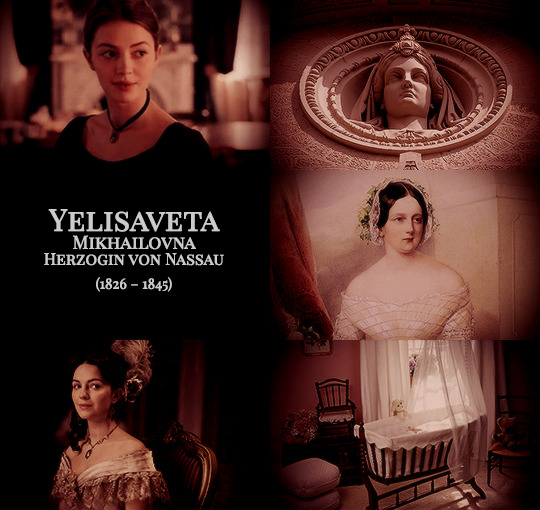
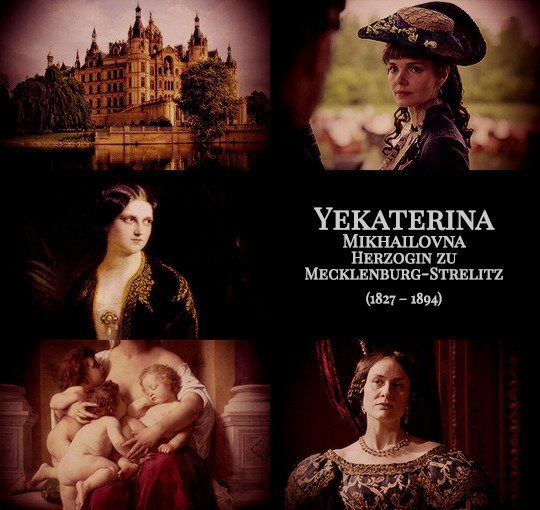
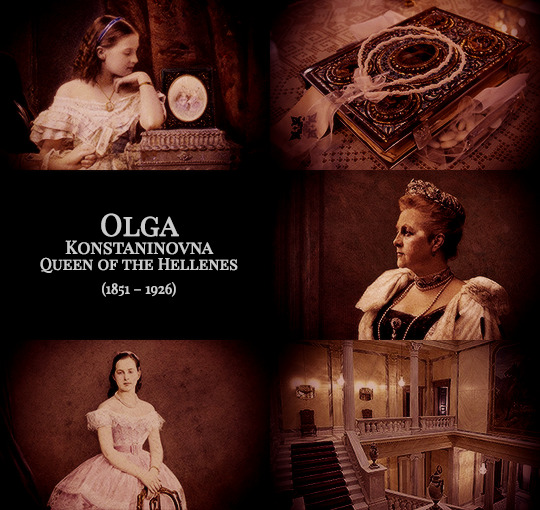
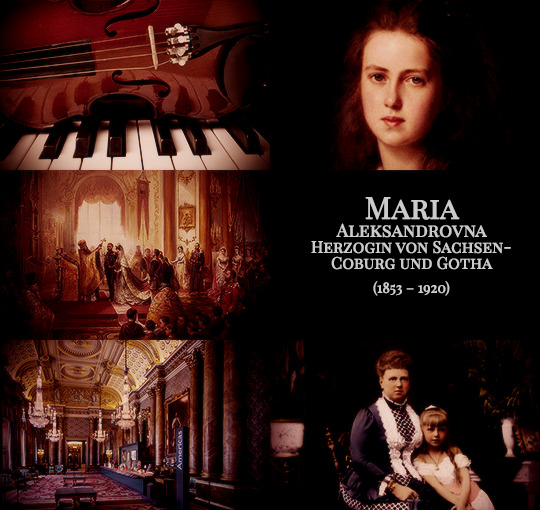
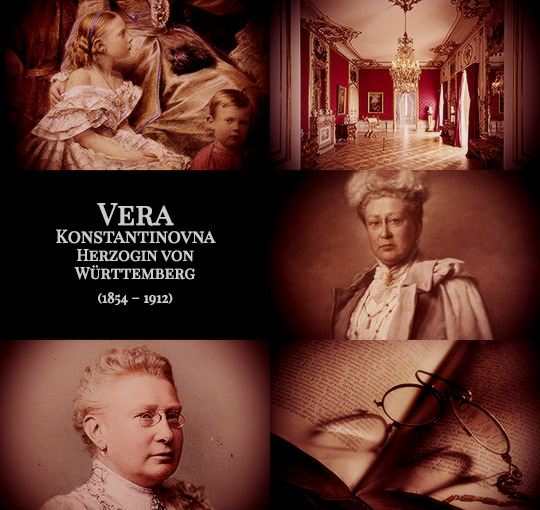
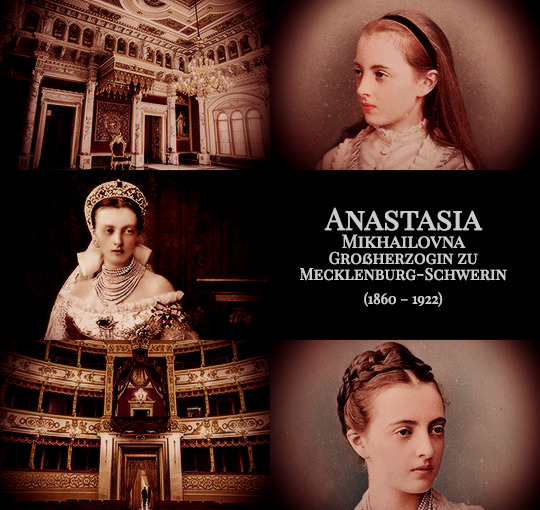
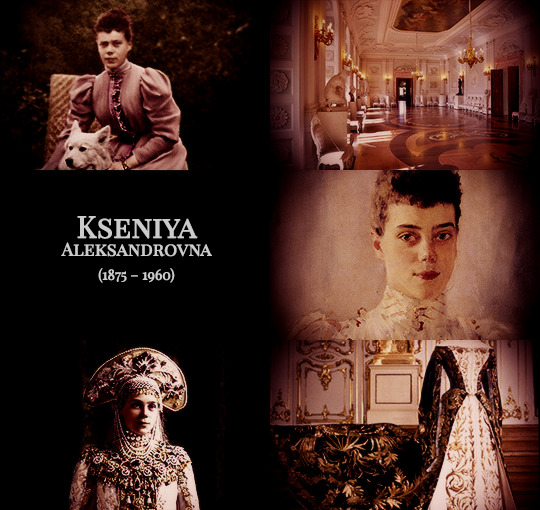
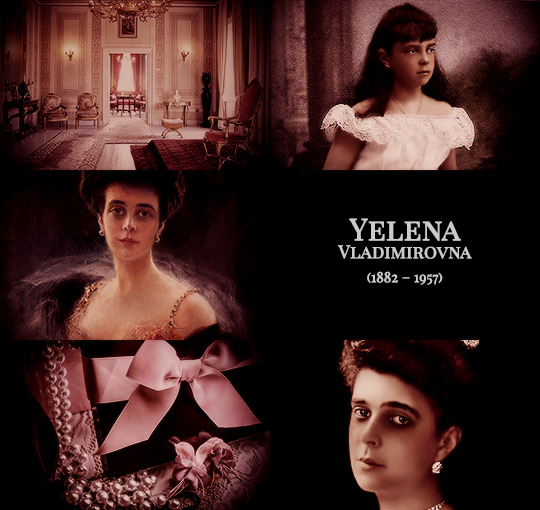
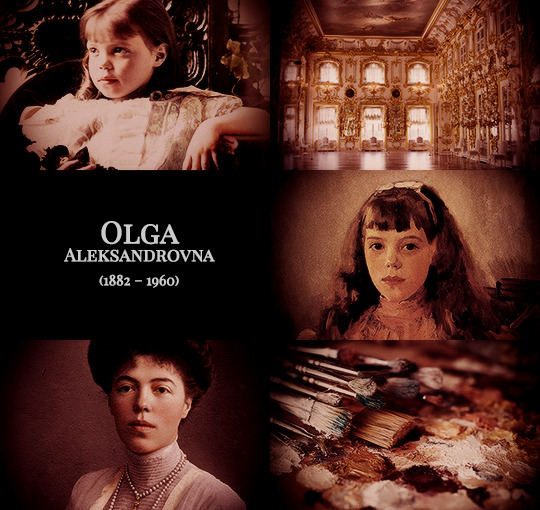
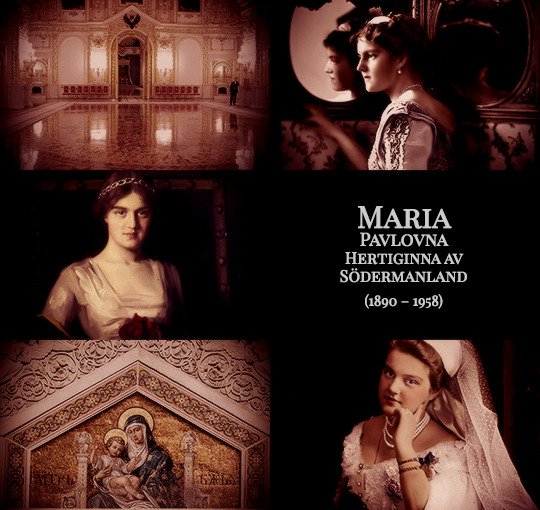
Women of the House of Romanov, part III
Grand Duchess Yelisaveta Mikhailovna. Daughter of Grand Duke Mikhail Pavlovich and Charlotte von Württemberg.
Grand Duchess Yekaterina Mikhailovna. Daughter of Grand Duke Mikhail Pavlovich and Charlotte von Württemberg. Mother of Helene zu Mecklenburg-Strelitz, Prinzessin von Sachsen-Altenburg
Grand Duchess Olga Konstaninovna. Daughter of Grand Duke Konstantin Nikolaevich and Alexandra von Sachsen-Altenburg. Mother of Alexandra of Greece and Denmark and Maria of Greece and Denmark.
Grand Duchess Maria Aleksandrovna. Daughter of Tsar Aleksandr II and Marie von Hessen und bei Rhein. Mother of Marie of Edinburgh, Queen of Romania; Victoria Melita of Saxe-Coburg and Gotha; and Beatrice of Saxe-Coburg and Gotha, infanta de España.
Grand Duchess Vera Konstantinovna. Daughter of Grand Duke Konstantin Nikolaevich and Alexandra von Sachsen-Altenburg. Mother of Elsa von Württemberg, Prinzessin zu Schaumburg-Lippe and Olga von Württemberg, Prinzessin zu Schaumburg-Lippe.
Grand Duchess Anastasia Mikhailovna. Daughter of Grand Duke Mikhail Nikolaevich and Cäcilie Auguste von Baden. Mother of Alexandrine zu Mecklenburg, Dronning af Danmark and Cecilie zu Mecklenburg, Kronprinzessin des deutschen Kaiserreichs.
Grand Duchess Kseniya Aleksandrovna. Daughter of Tsar Aleksandr III and Dagmar af Danmark. Mother of Princess Irina Aleksandrovna.
Grand Duchess Yelena Vladimirovna. Daughter of Grand Duke Vladimir Aleksandrovich and Marie zu Mecklenburg. Mother of Olga of Greece and Denmark; Elisávet of Greece and Denmark, Gräfin zu Toerring-Jettenbach; and Marina of Greece and Denmark, Duchess of Kent.
Grand Duchess Olga Aleksandrovna. Daughter of Tsar Aleksandr III and Dagmar af Danmark.
Grand Duchess Maria Pavlovna. Daughter of Grand Duke Pavel Aleksandrovich and Alexandra of Greece and Denmark.
#historyedit#house of romanov#russian history#european history#women's history#history#19th and early 20th#nanshe's graphics
86 notes
·
View notes
Text
✧ — — starter for : kadri && artair ( @sapphvms ) ✧ — — when : chapter ii , event ii ‘the festival of the divine’ ✧ — — where : the evergreen tree in the castle courtyard

he’s standing at the large evergreen, a soft smile gracing his face as his eyes are drawn to delicately painted flowers tucked into the bristling branches. he recognizes daphne’s art style immediately, the intricacy of the design- knowing that it would’ve been something she put time into- and his heart warms at the simple act. all at once, his attention is pulled by the sound of a shout, boots thudding against snow dusted courtyard and a couple of speeding youths ( the young anastase lord vasile and the princeling dimitri, neck in neck and laughing ) flying on sure feet around the curve of the large tree and disappearing down a stone covered breezeway. half of a moment later came the sound of smaller boots furious in pursuit, barreling past the tree and coming to a stop, looking for the escaped playmates.
when euan anastase’s eyes meet his, kadri smiles, letting his eyes roll off to the side as if to point, giving his head a slight nod towards the breezeway the other boys had disappeared to, watching the younger boy take off running. his eyes follow the little lord’s disappearing figure, his mind on yekaterina and her encouragement; he’d been avoiding his betrothed and his family since the pardon— hell, he’d been avoiding most people, unsure of how to proceed now that there’s a black mark against his name. but he was innocent and the only way things were going to start to go even somewhat back to normal was if he acted as if they were.
he feels eyes on him ( not uncommon nowadays, he feels them everywhere ) and his head turns, feeling a jolt run through him when his eyes locked with artair’s. for a heartbeat, there’s a definite urge to politely excuse himself and continue to avoid artair ( one step- first one’s the hardest ) but he forces his feet to move forward, crossing the brief distance between them. there’s an invisible manacle on his tongue, locking it and choking his words with apprehension— he didn’t know how to talk to artair before and whatever sort of confidence he had been gaining with the other man had disappeared the moment he’d been hauled in chains and branded traitor.
but nothing was going to go back to normal unless he acted as if they were. ( let them say it to your face so that you can counter it with the truth. ) “unless you hurry, i’m afraid you’ll be coming in last,” he says after a long moment of grappling for something to say, voice soft and gently teasing, looking towards where the boys had disappeared. turning his head back to artair, there was a tentative expression on his face, “since you’ll lose the race, perhaps i can entreat you to talk with me for a while.”
6 notes
·
View notes